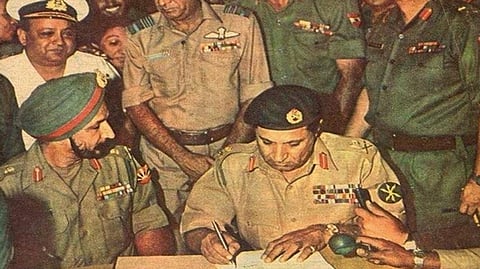
- Home
- न्यूजग्राम
- NewsGram USA
- India
- World
- Politics
- Entertainment
- Culture
- Lifestyle
- Economy
- Sports
- Sp. Coverage
- Misc.
- NewsGram Exclusive
- Jobs / Internships

The India-Pakistan War of 1971 is known as one of the most heroic victories in military history. It ended with the surrender of Pakistani forces in East Pakistan, with almost 1,00,000 soldiers being taken prisoners of war. Victory of India led to liberation of Bangladesh on December 16. Vijay Diwas is celebrated on this day.
Bangladesh Liberation (The Tribune, Archives)
Field Marshal Sam Manekshaw during 1971 India-Pakistan war (DPR Photo Division Archives)
In his book The 1971 Indo-Pak War: A Soldier's Narrative Pakistani Major General Hakeem Arshad Qureshi a veteran of this conflict noted:"We must accept the fact that, as a people, we had also contributed to the bifurcation of our own country." The Hamoodur Rahman Commission, which was set up to investigate the causes of defeat of Pakistan, laid the blame squarely on Pakistani generals, accusing them of debauchery, smuggling, war crimes and neglect of duty.
– by Shaurya Ritwik, Shaurya is Sub-Editor at NewsGram and writes on Geo-politcs, Culture, Indology and Business. Twitter Handle – @shauryaritwik
